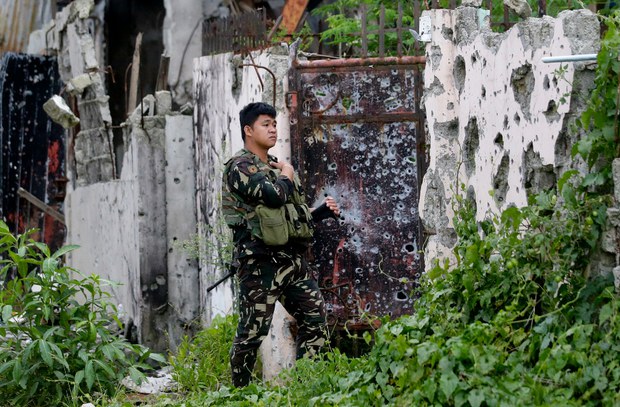Filipino Militant Gets 40 Years for Marawi Terror Attack
2018.11.21
Cotabato, Philippines
 A soldier stands beside a bullet-riddled gate of a home near where government troops battled pro-Islamic State militants in the southern Philippine city of Marawi, June 15, 2018.
A soldier stands beside a bullet-riddled gate of a home near where government troops battled pro-Islamic State militants in the southern Philippine city of Marawi, June 15, 2018.
A Philippine court sentenced a pro-Islamic State militant Wednesday to 40 years in prison for terrorism connected to last year’s siege by Islamic State-linked fighters in the southern city of Marawi that provoked a battle with government forces and left more than a thousand people dead.
Acting Presiding Judge Felix Reyes of the Regional Trial Court Branch 70 in the suburban Taguig city in Manila convicted Nur Supian of the crime of terrorism in connection with the months-long siege.
Supian had trained fresh militants recruited to the Maute group in the south, prosecutors said. In his ruling, Reyes said prosecutors were able to prove that Supian was responsible for putting up Camp Javal Nur or Tiger Base in remote Kalingalan Caluang town on Jolo island, where local armed men underwent military trainings.
“After proving the established plan of accused Supian, there is no doubt that his acts sowed and created a condition of widespread and extraordinary fear and panic among the populace, in order to coerce the government to give in to unlawful demand. Supian is guilty of the crime of terrorism under Anti-Terrorism Law,” the decision stated.
Two of Supian’s men, identified as Araji Samindih and Umad Harun, were found guilty of rebellion and given a sentence of up to 14 years in prison each.
The court cleared three others, identified as Marvin Ahmad, Salip Ismael Abdulla and Issa Ukkang. It said the prosecution failed to prove their involvement in the attack.
Witnesses have positively identified Samindih and Harun as among hundreds members of the militant Maute group that took part in sacking Marawi, which was once a scenic Muslim trading hub that had been transformed into a wasteland after five months of gunbattles.
The court’s decision was quickly hailed by Marawi residents.
“That’s good news,” Drieza Lininding, a Muslim religious leader in the city, told BenarNews. “Those found guilty should pay for what they did.”
In May 2017, Maute gang members joined Islamic State local leader Isnilon Hapilon when his group ransacked Marawi. They destroyed the Catholic church, killed Christians and held dozens of hostages, including women and children.
They were aided by fighters from the Middle East and Southeast Asia, forcing the Philippine military to seek assistance from the United States and Australia, which provided vital aerial intelligence data that contributed to the militants’ defeat.
Hapilon and the top leaders of the Maute gang were killed in October, but President Rodrigo Duterte said dozens of extremists were believed to have escaped and fanned out into remote areas to recruit new fighters. At least 1,200 people were killed in the battle, most of them militants.
Richel V. Umel from Iligan City contributed to this report.







